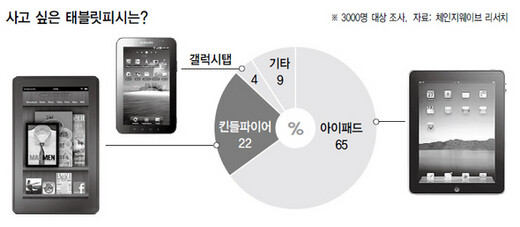hankyoreh
Links to other country sites 다른 나라 사이트 링크
Is the Kindle Fire a Galaxy Tab killer?

By Koo Bon-kwon, Technology Correspondent
The fight for second place in the global tablet PC market is in full swing. Currently, Samsung Electronics appears to be under threat from underdog Amazon, with its Kindle Fire device.
Until now, Samsung Electronics has enjoyed status as the second horse in the race led by Apple in the tablet PC market. This was the result of its rapid release of products such as the Galaxy Tab 7-inch, 8.9-inch and 10.1-inch, and concurrent increase in market share. Recently, however, there has been a clear change in the prevailing mood. Apple’s obtaining of legal decisions granting injunctions banning the sale of the Galaxy Tab in countries such as Germany and Australia due to intellectual property right infringement has dealt a heavy blow. Samsung’s end of year peak season strategy, too, has run into difficulties.
A more significant threat to the Galaxy Tab’s status, however, is the rapid progress made by e-book company Amazon. Amazon’s 7-inch tablet PC Kindle Fire, which went on sale in the United States on Nov. 15, has caused a storm, with 1.5 million advance orders alone. Cited as the strongest selling points of the Kindle Fire, which has a small screen and no camera, are its competitive $199 price tag, less than half the $499 dollar price of the iPad 2, and its abundant content ecosystem.
In fact, a survey of tablet PC demand conducted among more than 3,000 people in the North American market early this month by market research firm ChangeWave revealed that 65% of respondents intended to buy iPads and 22% to buy Kindle Fires. The total proportion of those intending to buy any of the various models of Galaxy Tab came to no more than 4%.
The Kindle Fire‘s ability to push the Galaxy Tab aside and emerge as Apple’s main competitor so soon after its launch was influenced to a great extent by the fact that Amazon chose a unique and distinct strategy, rather than copying Apple. Amazon even took the risk of making big changes to the Android OS and applying “Amazon Silk.” Its pricing policy also allowed it to stand out. Amazon chose to begin by fixing a low retail price for its device, then make profits through Amazon.com’s abundant contents and a related contract payment system ($79 per year).
Please direct questions or comments to [englishhani@hani.co.kr]
Editorial・opinion
![[Column] Has Korea, too, crossed the Rubicon on China? [Column] Has Korea, too, crossed the Rubicon on China?](https://flexible.img.hani.co.kr/flexible/normal/500/300/imgdb/original/2024/0419/9317135153409185.jpg) [Column] Has Korea, too, crossed the Rubicon on China?
[Column] Has Korea, too, crossed the Rubicon on China?![[Correspondent’s column] In Japan’s alliance with US, echoes of its past alliances with UK [Correspondent’s column] In Japan’s alliance with US, echoes of its past alliances with UK](https://flexible.img.hani.co.kr/flexible/normal/500/300/imgdb/original/2024/0419/2317135166563519.jpg) [Correspondent’s column] In Japan’s alliance with US, echoes of its past alliances with UK
[Correspondent’s column] In Japan’s alliance with US, echoes of its past alliances with UK- [Editorial] Does Yoon think the Korean public is wrong?
- [Editorial] As it bolsters its alliance with US, Japan must be accountable for past
- [Guest essay] Amending the Constitution is Yoon’s key to leaving office in public’s good graces
- [Editorial] 10 years on, lessons of Sewol tragedy must never be forgotten
- [Column] A death blow to Korea’s prosecutor politics
- [Correspondent’s column] The US and the end of Japanese pacifism
- [Guest essay] How Korea turned its trainee doctors into monsters
- [Guest essay] As someone who helped forge Seoul-Moscow ties, their status today troubles me
Most viewed articles
- 1[Column] The clock is ticking for Korea’s first lady
- 2[Correspondent’s column] In Japan’s alliance with US, echoes of its past alliances with UK
- 3Samsung barricades office as unionized workers strike for better conditions
- 4After 2 months of delayed, denied medical care, Koreans worry worst may be yet to come
- 5[Column] Has Korea, too, crossed the Rubicon on China?
- 6[Editorial] When the choice is kids or career, Korea will never overcome birth rate woes
- 7Hong Se-hwa, voice for tolerance whose memoir of exile touched a chord, dies at 76
- 8US overtakes China as Korea’s top export market, prompting trade sanction jitters
- 9Constitutional Court rules to disband left-wing Unified Progressive Party
- 10Nearly 1 in 5 N. Korean defectors say they regret coming to S. Korea